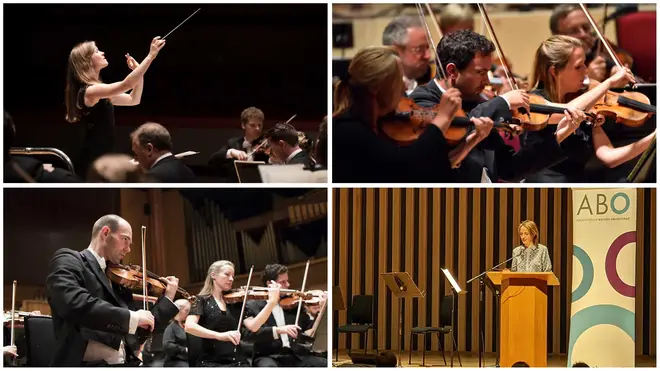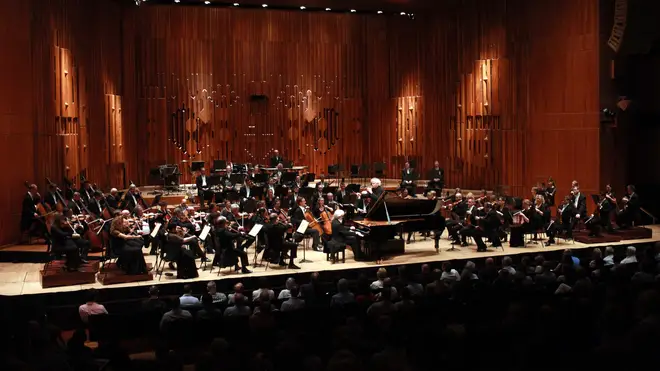On Air Now
Classic FM Breakfast with Tim Lihoreau 7am - 9am
29 January 2020, 15:44 | Updated: 29 January 2020, 17:17

As the Association of British Orchestra’s annual conference gets underway, new analysis reveals the good health of the country’s symphonic sector.
Once a year, representatives from orchestras across the UK get together to meet, share ideas, and celebrate the wonderful things about music-making in the country. It's run by the Association of British Orchestras (ABO) and takes place this year in Manchester and Salford.
Classic FM, Principal Media Partner of this conference since 2003, joins the ABO alongside ensembles from all corners of the country.
The theme of this year's conference is '2020 Vision'. The ABO says it wants to take the opportunity to look 10 years ahead, to what the landscape for orchestras will be in 2030. Programming, workforce, funding, broadcasting and environment will all be discussed in the three-day event, as the UK's orchestras look towards a "vibrant and sustainable" future.
And as the conference begins, there is every reason to feel positive about the future of orchestral music, as new analysis shows positive growth and resilience in the industry.
Helen Whately MP, Parliamentary Under-Secretary of State for Arts, Heritage and Tourism gave the keynote address on the conference's opening day on Wednesday.
Whately opened her speech saying "the UK has a musical tradition that's the envy of the world".
The Under-Secretary of State said that participation in arts and culture formed a key part of the Conservative government's "leveling up" policy, for young and old around the country.
"It's vital that all young people, no matter where they're born, have the opportunity to access high-quality creative and cultural education, enriching their lives, nurturing those with talent and ambition, and providing skills needed for careers in the industry."
Two days before the UK leaves the EU, Whately acknowledged the challenges that Brexit brings for the orchestral industry. She said she understands the importance of orchestras touring in Europe, and this is one of the reasons why the government wants reciprocal movement arrangements with the EU.
Great to hear the Minister for Arts, Heritage & Tourism @helen_whately talk at #abo20 about the success of British orchestras at home and abroad, plus their importance to music education pic.twitter.com/hWqhIwM2qz
— ABO (@aborchestras) January 29, 2020
Every three years the ABO carries out a detailed statistical analysis of the UK's professional orchestras. 2019's report reveals positive growth in key areas: three per cent growth in numbers of performances, and two per cent growth in audience numbers.
There was also positive news in outreach and education, as ensembles strived to take their music to new, young and diverse audiences. Nearly 700,000 children and young people attended this education and outreach activity.
There is promising news on the financial side of things too, with a 26 per cent increase in orchestras' income since 2016.
The ABO says these figures "reveal a sector that is resilient and enterprising and a cultural ambassador for the UK."
You can read the full report here.

In his opening address to the conference, Classic FM's Senior Managing Editor, Sam Jackson praised the "creativity, tenacity and commitment" of the UK's orchestras.
"It's been a bumpy old year," he told delegates, "With division, and uncertainty, and a challenging political climate, to put it mildly – but you've continued to bring great music to hundreds of thousands of people: in the concert hall, in the community, and via outstanding recordings. That's worth reflection and celebration."
Ahead of the conference, Director of ABO, Mark Pemberton also reflected on the political and social landscape and what it means for orchestras around the British Isles.
"Big issues facing our sector over the next decade: climate change, diversity and inclusion are all crucial priorities as we look ahead to the next ten years. Brexit has of course also dominated the ABO's thinking over the past year and in the week in which we leave the EU, we will be looking at ways in which we can continue to ensure the best possible outcome for our sector.
"Despite these ongoing challenges, it is reassuring to learn from our State of the UK's Orchestras 2019 report, released today, of the incredible resilience of our orchestras."